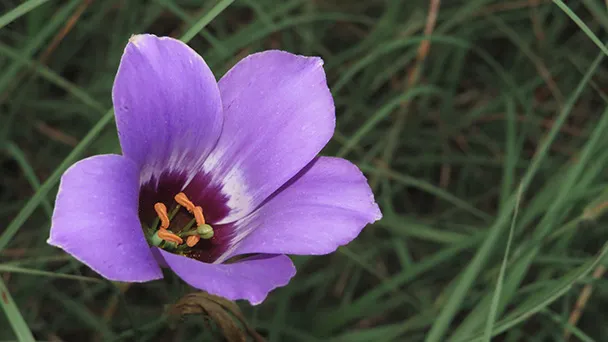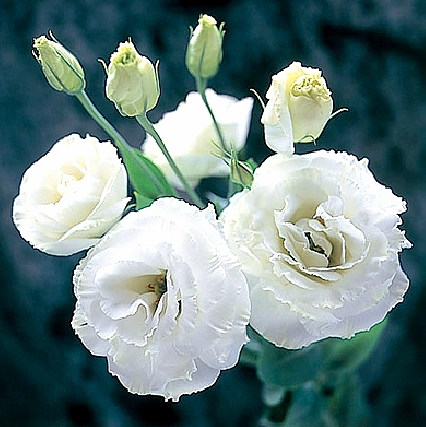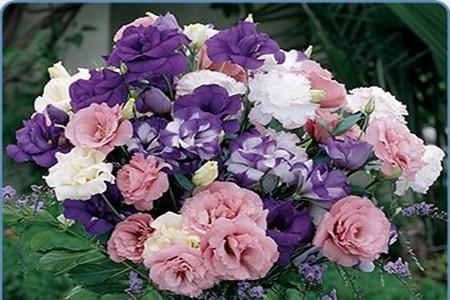Texas bluebell (Eustoma Russellianum) Growing & Caring tips
Written by Maggie
Nov 24 2021

How to grow and care for Texas Bluebell? I believe many friends who like Texas Bluebell would like to know that it is not difficult to care for Texas Bluebell flowers well. As long as the flowers are done well in daily maintenance, Texas Bluebell will naturally be easy to grow.
Texas Bluebell Care Quick Info
| Botanical/Scientific Name | Eustoma Grandiflorum |
| Common Name | Texas Bluebells |
| When to Grow/Bloom/Harvest | Planted in the spring/Bloom from late February or March through mid- or late April. |
| Uses | In pots for patios and terraces |
| Origin | North America |
| Light Care | Full Sun |
| Soil Care | Loose soil with good drainage |
| Temperature Care | 20 to 25 °C |
| Humidity Care | Moisture |
| Watering | Water regularly throughout the season |
| Pruning Care | Do not need pruning |
| Fertilizer Care | Slow-release fertilizer |
| Propagation | Surface seeding |
| Toxic | Not poisonous |
| Flower Color | Pink, white, and deep purple-blue color varieties |
1. Soil care for growing Texas bluebell
Texas Bluebell prefers fertile, loose soil with good drainage. When we grow and care for Texas bluebell, it is best to choose improved garden soil with peat soil, rice husk and a small amount of lime.
2. Light care for growing Texas bluebell
Texas Bluebell likes a warm, well-lit environment. Long hours of sunlight encourage the growth of its stems and leaves and the formation of flower buds. When we grow and care for texas bluebell during the winter and early spring, we should pay special attention to filling light, usually adding 2 ~ 4 hours at night.
3. Water and moisturize care for growing Texas bluebell
Although Texas Bluebell likes a humid environment, Texas Bluebell has strict requirements on water. Excessive water will cause poor root growth and prone to disease infection. Too little water causes the stems and leaves to be thin and bloom early. When we grow and care for Texas bluebell, keep the media moist for the first month after transplantation. Drip irrigation can be used to control moisture
4. Temperature care for growing Texas bluebell
The optimum temperature for growth of Texas Bluebell is 20 ~ 24℃ in the daytime and 16 ~ 18℃ at night. Its growth rate, such as the elongation of internode, the speed of flower bud differentiation, and the length of harvest period are all easily affected by temperature.

5. Fertilization care for growing Texas bluebell
Texas bluebell is a high-fertility plant. If the base fertilizer is not enough, top dressing is important. In the middle and late growth period, if the stem is easily broken or the stem is longitudinal cracked, it may be caused by boron deficiency. When we grow and care for Texas bluebell, spray plants with a diluted solution of boric acid can ameliorate this phenomenon.
6. Growing Texas bluebell care for pest control
The common diseases of Texas bluebell are Rhizoma blight, Gray mould, Sclerotia and so on. When we grow and care for Texas bluebell, in addition to the timely removal of the disease plant, the removal of the disease leaves and flowers, the use of anti-Kunning, Mildew, mancozeb and other agents for prevention and treatment, usually to strengthen ventilation, reduce air humidity.
7. Growing Texas bluebell care before flowering
Texas bluebell flower blooms beautifully. In fact, we can make it bloom more often by topping it before it blooms.
When we grow and care for Texas bluebell during the differentiation period of flower buds of Texas Bluebell, attention should be paid to reducing watering to avoid unproductive growth of plants and affecting flowering. In addition, high temperature and appropriate light should also be maintained. When we grow and care for Texas bluebell before the flower bud differentiation of Texas bluebell, short-term sunshine treatment is generally required, and timely shading is required. Fertilizer generally does not apply too much, apply a little phosphate or potash fertilizer at most.
Sometimes you like to make Texas bluebells bloom early so you can see the beautiful flowers. But early flowering is actually not a good idea, the plant will not grow well and the buds will be small. If a bud is found to differentiate early, it can be removed.
8. Growing Texas bluebell care after flowering
Texas Bluebell flower also needs to be cared after flowering.
Texas bluebells flowers can be regrown if they do not consume much nutrients at flowering time. After texas bluebells have bloomed, they can be harvested from the second pair of true leaves on top of the plant. Thereafter, when we grow and care for Texas bluebell, carry on reasonable water and fertilizer management. Basically, after three months, Texas Bluebell still has a chance to grow beautiful flowers again.

Latest Updated
- Benefits of Bugleweed - 7 Science-backed Health Benefits
- Bugleweed Dangers & Side Effects - Is It Poisonous?
- How to Plant Evergreen Trees - What You Should Know
- When to Plant Evergreens - Grow Guide for Evergreen Trees
- 12 Wonderful Evergreen Shrubs for Your Garden
- 12 Popular Evergreen Plants with Pictures for Beginners
- When And How To Prune A Lilac Bush Like a Pro
- How to Grow & Care for Lilac Vine (Hardenbergia Violacea)
- Japanese Lilac Tree (Syringa Reticulata) Care & Propagation Guide
- Shumard Oak Pros and Cons - What to Know
Popular Articles
- Winter maintenance of Antirrhinum Majus
- How to Grow Terminalia Mantaly Tree
- How to Grow and Care for Crossostephium Chinense
- How to grow Antirrhinum Majus in spring
- Peristeria Elata (Dove Orchid) Profile: Info & Care Guide
- Underwatered Snake Plant (Sansevieria Trifasciata) - Signs And How To Fix
- How to Care for Brazilian Jasmine Plant (Mandevilla Sanderi)
- How to Grow & Care for Graptopetalum Purple Delight in Summer
- Rosa Chinensis (China Rose): Plant Growing & Care Tips
- How to Care for Baby Sun Rose (Aptenia Cordifolia)